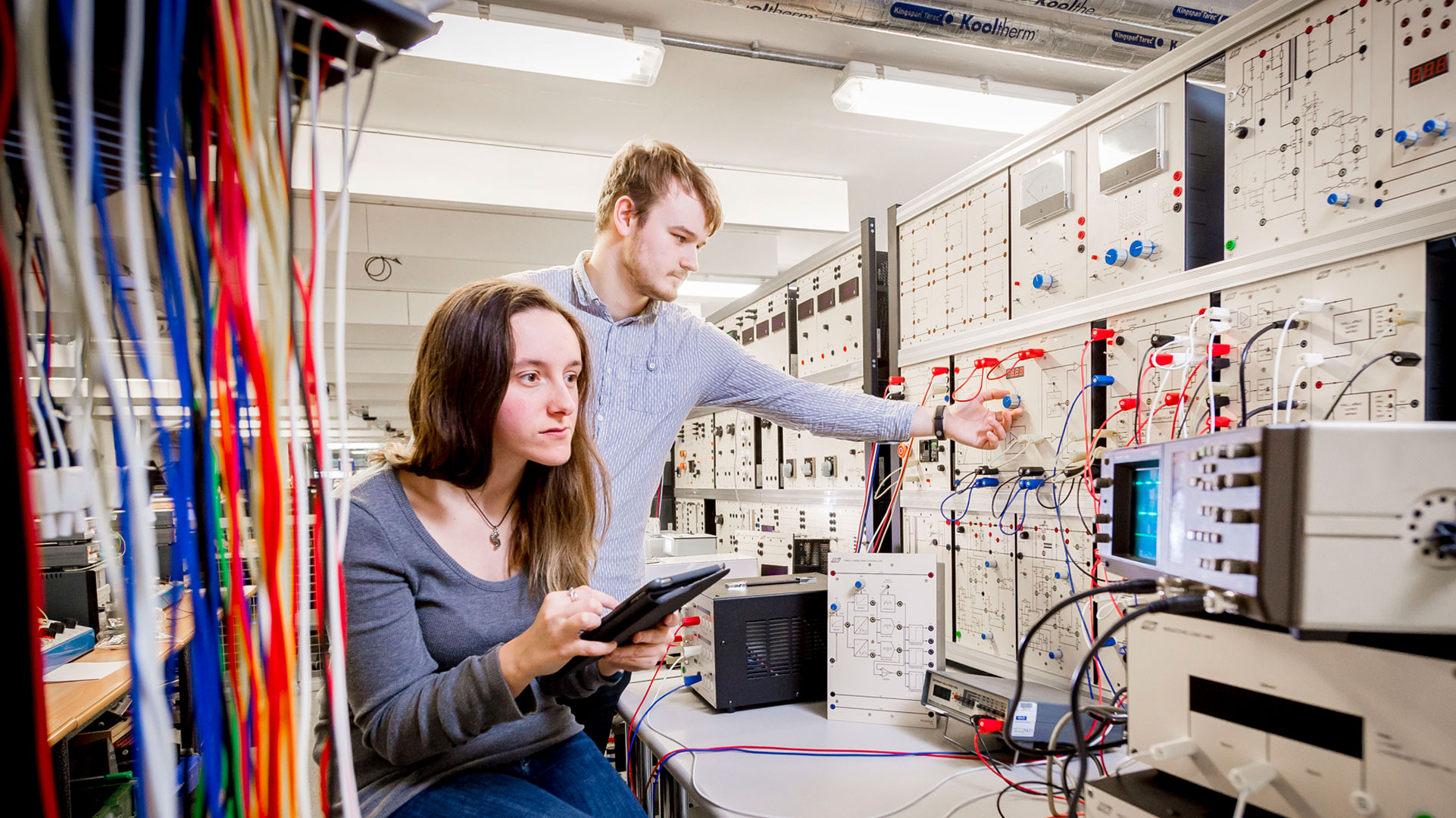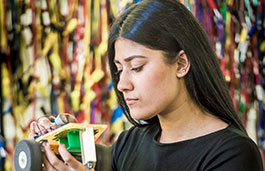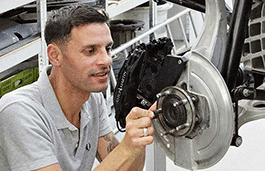Search
Electrical Automotive Engineering MSc
Study level: Postgraduate
Our postgraduate course in electrical automotive engineering aims to provide the expertise required to meet the modern transportation market demands. Carefully planned, it consists of a balanced mix between electric power, electronics and communications.
Year of entry
2024-25
Location
Coventry University (Coventry)
Study mode
Full-time
Part-time
Sandwich
Duration
1 year full-time
2 years part-time
2 years sandwich
Course code
EECT007
Start date
September 2024
Course overview
Our vision is to create experienced and specialised engineers who will be highly sought after by the electrical automotive engineering market.
The overall aims of the course are to:
- Provide a deep and comprehensive understanding of the current electric/hybrid electric vehicles technology, concepts and challenges.
- Develop academic and practical skills in electric power-related areas such as electrical machines and drives, power electronics and batteries, covering all aspects of the vehicle’s powertrain.
- Develop a solid background in vehicle electronics, signal processing and communications needs and challenges.
- Educate graduates, typically from a mechanical/automotive engineering background, in the modern area of electrical automotive engineering and provide a valuable qualification for this growing and expanding market.
You will also have the option to apply for a ‘professional work placement’ opportunity2, designed to further develop your skills and knowledge with the aim of maximising your employability prospects. See modules for more information.
Rated Gold Overall
Teaching Excellence Framework (TEF) 20235 QS Stars for Teaching and Facilities
QS Stars University RatingsTop 5 Student City in England (Coventry)
QS Best Student Cities Index 2025Why you should study this course
- Electric and Hybrid Electric Vehicles constitute a modern and timely area in engineering, one expected to expand very quickly in the next few years.
- Electric vehicles minimise pollution whilst increasing power efficiency. Moreover, areas such as autonomous vehicles and smart transportation grids are beginning to become reality.
- Coventry has a long history in the automotive and transport industries. Coventry University plays a significant role in shaping the future of modern transportation and has been a valuable participant in various projects and collaborations with industry and academia in the area of transportation, with significant experience and technical know-how. Furthermore, the Institute for Future Transport and Cities research centre has been established by Coventry University to organise and promote research activities in the technological field of clean transportation.
- The delivery of this course will consist of a balance between theory, simulations and laboratory testing, creating an ideal teaching and learning environment. The aim is to cultivate not only a strong foundation in electrical automotive engineering, but also critical and original thinking.
- You will have the opportunity to benefit from our modern teaching environment and infrastructure4, practical hands on laboratory equipment and specialised modern simulation tools adopted by industry. The teaching activities are partially industry and research focused with the aim of motivating and promoting engineering development and originality among our students.
Accreditation and professional recognition
This course is accredited1 and recognised by the following bodies:

Chartered Management Institute
As part of this course, you will undertake a professional development module which is currently accredited by the Chartered Management Institute for the 2024-25 intake. Upon successful completion of this module, you will gain the CMI Level 7 Certificate in Strategic Management and Leadership Practice at no additional cost.
Coventry University’s accreditation with CMI is currently ongoing for the relevant modules and is regularly reviewed and monitored by the CMI through their quality systems.
What you'll study
Half of your study will focus on electrical machines, power semiconductors, automotive sensors and automotive electronics. The other half concentrates on automotive cybersecurity, automotive networking, energy storage and entrepreneurship.
Ultimately you will be asked to perform a detailed research project or design study in a technical aspect of the course with the help of an experienced supervisor. You may choose a project topic to suit your interests and career aspirations as agreed with your tutor.
With work placement pathway
The ‘With work placement’ opportunity2 enables you to apply in semester 1 for an optional work placement of up to 12 months, extending the duration of your master’s to 24 months. The placement provides an opportunity for you to develop expertise and experience in your chosen field with the aim of enhancing your employability upon graduation. The work placement would take place in semesters 3, 4 and 5.
Please note that the optional placement modules will incur an additional tuition fee of £4,000. Placement opportunities may also be subject to additional costs, visa requirements being met, subject to availability and/or competitive application. Work placements are not guaranteed but you will benefit from the support of the Talent Team in trying to find and secure an opportunity. Find out more about the work placement option.
We regularly review our course content, to make it relevant and current for the benefit of our students. For these reasons, course modules may be updated.
How you'll learn
Teaching methods may include:
- Lectures
- Laboratory hands-on exercises
- Simulated laboratory exercises
Teaching contact hours
The number of contact hours may vary from semester to semester, however, on average, it is likely to be around 30 hours per 15 credit module.
You will be expected to undertake significant self-directed study of approximately 35 hours each week, depending on the demands of individual modules.
Your project based semester will be supervisor supported, where you will be expected to undertake self-directed study in the region of 50 hours per week.
Students are expected to meet with their supervisors at least once per fortnight.
This course can be studied on a full-time or part-time basis. Whilst we would like to give you all the information about our part-time offering here, it is tailored for each course each year depending on the number of part-time applicants. Therefore, the part-time teaching arrangements vary. Please request information about studying this course part-time.
The contact hours may be made up of a combination of face-to-face teaching, individual and group tutorials, and online classes and tutorials.
As an innovative and enterprising institution, the university may seek to utilise emerging technologies within the student experience. For all courses (whether on-campus, blended, or distance learning), the university may deliver certain contact hours and assessments via online technologies and methods.
Since COVID-19, we have delivered our courses in a variety of forms, in line with public authority guidance, decisions, or orders and we will continue to adapt our delivery as appropriate. Whether on campus or online, our key priority is staff and student safety.
Assessment
This course will be assessed using a variety of methods which could vary depending upon the module. Assessment methods may include coursework and examinations.
The Coventry University assessment strategy aims to ensure that our courses are fairly assessed and allows us to monitor student progression towards achieving the intended learning outcomes.
International experience opportunities
Internationalisation is an important aspect of this course, mainly due to the international interest and focus of the worldwide market on electrical vehicles.
Entry requirements
Typical offer for 2024/25 entry.
Fees and funding
2024/25 tuition fees.
| Student | Full-time | Part-time |
|---|---|---|
| UK, Ireland*, Channel Islands or Isle of Man | £11,200 | £4,000 (Work placement option additional fee) | Request fee information |
| EU | £11,200 | £4,000 (Work placement option additional fee) per year with EU Support Bursary** £20,050 | £4,000 (Work placement option additional fee) per year without EU Support Bursary** |
Not available |
| International | £20,050 | £4,000 (Work placement option additional fee) | Not available |
For advice and guidance on tuition fees3 and student loans visit our Postgraduate Finance page and see the university's Tuition Fee and Refund Terms and Conditions.
We offer a range of International scholarships to students all over the world. For more information, visit our International Scholarships page.
Tuition fees cover the cost of your teaching, assessments, facilities and support services. There may be additional costs not covered by this fee such as accommodation and living costs, recommended reading books, stationery, printing and re-assessments should you need them.
The following are additional costs not included in the tuition fees:
- Any optional overseas field trips or visits: £400+ per trip.
- Any costs associated with securing, attending or completing a placement (whether in the UK or abroad).
*Irish student fees
The rights of Irish residents to study in the UK are preserved under the Common Travel Area arrangement. If you are an Irish student and meet the residency criteria, you can study in England, pay the same level of tuition fees as English students and utilise the Tuition Fee Loan.
**EU Support Bursary
Following the UK's exit from the European Union, we are offering financial support to all eligible EU students who wish to study an undergraduate or a postgraduate degree with us full-time. This bursary will be used to offset the cost of your tuition fees to bring them in line with that of UK students. Students studying a degree with a foundation year with us are not eligible for the bursary.
Facilities
Our aim is to offer you sector-leading facilities4:

The Library
You will benefit from our support designed to help you succeed and our industry-relevant teaching and resources. These include our modern library and computing facilities, dedicated careers advice and Your Students’ Union.

Jaguar Centre
The Jaguar Centre has been specifically designed to provide facilities and services to support our postgraduate students including social spaces, computer suites and separate areas for small group study.

The Hub
The Hub is the centre of student campus life. It's also home to the Health and Wellbeing Centre, the Spirituality and Faith Centre, the Tank Studio, Student Success Coaches and the Enterprise Hub.
Careers and opportunities
Upon successful completion, you will be able to:
- Develop learn and apply new theories, concepts and methods.
- Critically evaluate, model and test the operation of electrical systems and components for automotive applications.
- Demonstrate a thorough understanding of electrical power conversion and power flow.
- Analyse the degradation mechanisms and ageing process of the automotive electrical and electronics systems.
- Gain an awareness of current standard and specifications of the on-board electronics and networking system to design and assess systems and components.
- Develop extensive knowledge and understanding of a wide range of computer modelling and simulation software.
- Conduct rigorous and ethical research/formal enquiry into related issues that require familiarity with a range of research sources and appropriate methodologies.
- Demonstrate awareness and ability to critically evaluate risks, including health and safety when conducting design and tests.
Electrification of transportation is one of the most rapidly expanding markets, while manufacturers are seeking appropriately educated engineers to cover the needs in all aspects of electrical and electronic engineering focusing on electric vehicles.
Specialisation in this particular area could significantly enhance your career prospects and may provide excellent opportunities for a challenging, well paid and interesting job.
We currently have strong links with local industry collaborators including JLR, HORIBA MIRA Ltd, FEV UK, ZF, BOSCH, Ford Motor, Schneider Electric Systems UK Limited, Industratech Limited and National Grid. Coventry University also runs Microcab and the Centre for Advanced Low Carbon Propulsion Systems (C-ALPS) lab. They are dedicated to developing hydrogen fuel vehicles and EVs.
Graduate Immigration Route visa
Based on current information from the UK Government, international students whose study extends beyond summer 2021 may be eligible for a visa under the UK Government’s Graduate Immigration Route, which will enable students to stay and work, or look for work, in the UK at any skill level for up to two (2) years. Check the most up to date guidance available to check your eligibility and any updates from the UK Government before making an application or enrolment decision.






